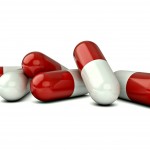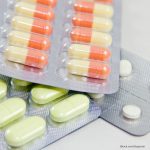A new study has shown that antibacterial soaps are better at killing Shigella bacteria than soaps that do not contain antibacterials. But do the risks of using antibacterial soaps outweigh the benefits? Each year, about 18,000 Americans are diagnosed with shigellosis, the infection caused by the Shigella bacteria. Symptoms of shigellosis include diarrhea that contains blood of puss, fever, and stomach cramps starting a day or two after exposure. Symptoms generally last about a week and hospitalization is rarely required. For the study, researchers compared two regular soaps with three antibacterial soaps and found that, overall, the antibacterial soaps were better at reducing the level of Shigella bacteria than regular soaps. But the active ingredients in at least of the antibacterial … [Read more...]
Cleveland and Pittsburgh Resolutions Against Antibiotic Use in Livestock
The cities of Cleveland and Pittsburgh have passed resolutions calling for a ban on the sub therapeutic use of antibiotics in livestock. The cities of Providence, Rhode Island and Redhook, New Jersey have also approved resolutions, and Seattle may join them soon. Seattle Council member Mike O'Brien said, "antibiotic resistance is a lot like the 'global warming' crisis of clinical medicine. It's a serious problem which will only worsen unless we take immediate action at all levels of government." The use of antibiotics for growth promotion and disease prevention in farm animals is linked to antibiotic resistance. Some antibiotics that are medically important for human beings are used on factory farms, endangering their use. In fact, the Foster Farms chicken Salmonella outbreak that has … [Read more...]
FDA Update on Guidance #213
Last year, the FDA announced a new voluntary guidance plan to help "phrase out" the use of medically important antibiotics in factory farm animals for purposes of growth promotion. The government asked the animal pharmaceutical industry to withdraw animal drug approvals used for production and to transfer the remaining uses of the drugs to prescription-only. Now the FDA says that out of 26 affected sponsors, 25 have confirmed in writing their intent to "engage with FDA as defined in Guidance #213" and have given the agency consent to list their names. Those corporations hold 99.6% of the appliances affected by Guidance #213, and represent 99.95% of the total sales of products affected by Guidance #213. Those corporations include Bayer Healthcare LLC Animal Health Division, G.C. … [Read more...]
FDA’s Guidance on Antibiotics in Animals Flawed
Food & Water Watch has studied the FDA's list of 400 drugs that fall under the jurisdiction of their Veterinary Feed Directive, voluntary guidance GFI #213, and found that 89% of them can still be given to healthy animals for reasons other than growth promotion. That guidance asks veterinary drug makers to voluntarily rescind the approval of the antibiotics for growth promotion. The antibiotics can still be given to animals in their feed, at sub therapeutic levels, to prevent disease. The list of drugs includes "217 medically important antibiotic drugs with growth promotion indications." Of those, 63% also have disease prevention indications. Of the remaining drugs, 59 can still be used for "disease control". That leaves just 23 drugs with non approved non therapeutic uses under the … [Read more...]
Center for Food Safety: FDA Should Protect Public Health
Center for Food Safety is calling on the FDA to protect public health, not factory farms. The overuse of antibiotics on these farms is compromising public health, since 70 to 80% of antibiotics used in this country are given in sub therapeutic levels to farm animals. The drugs are used as growth promoters and to prevent illness in unsanitary and overcrowded conditions, two conditions that promote the growth of antibiotic-resistant bacteria. They have put together a petition you can sign to ask the FDA to make the proposed Veterinary Feed Directive a law, not a guideline. Since it is only a guideline, no factory farm in the nation has to comply with it. The National Academy of Sciences has said that "a decrease in antimicrobial use in human medicine alone will have little effect on … [Read more...]
FDA Documents Show Agency Allows Livestock Antibiotic Use
The Natural Resources Defense Council (NRDC) has released documents from the FDA showing the agency allows antibiotic use in livestock despite "high risk" to people. Thirty potentially harmful antibiotics, including 18 rated as "high risk", will remain on the market as food additives to farm animals. This is despite an internal review that raised red flags on the issue. Use of those drugs in livestock exposes human beings to antibiotic resistant bacteria through the food supply. Scientific reviews of those antibiotics were conducted by the FDA between 2001 and 2010, but the drugs are still approved for use in industrial animal agriculture operations. The antibiotics are approved for "non therapeutic use", that is, they are used for growth promotion and to prevent disease in unsanitary, … [Read more...]
Groups Call on Foster Farms to Demonstrate Antibiotic Stewardship
More than 30 environmental, animal welfare, health, food safety, and consumer organizations have sent a letter to Foster Farms, asking that corporation to adopt stewardship practices for raising healthier chicken. That company has been linked to two large Salmonella outbreaks in the last year that have sickened thousands of people across the country. The current outbreak, which has sickened at least 416 people in 23 states with seven strains of Salmonella Heidelberg, many of them antibiotic-resistant, has hospitalized 40% of those sickened. The Natural Resources Defense Council says that "the spread of drug resistant bacteria throughout our communities and kitchens has threatened our health and contributed to the growing crisis of antibiotic resistance. More than 80% of all … [Read more...]
CDC: Antibiotic Resistance a Looming Health Threat in 2014
Antibiotic resistance is one of the top five public health threats looming in 2014, according to the Centers for Disease Control and Prevention (CDC). More than 2 million Americans are sickened with antibiotic-resistant infections every year, some as a result of food poisoning. Drug-resistant non-typhoidal Salmonella strains, or Salmonella strains other than Typhi, Paratyphi A, Paratyphi B, and Paratyphi C, are considered by the CDC to be a "serious" health threat. About 8 percent of cases from these strains, or 100,000 of the 1.2 million annual U.S. cases of food poisoning from non-typhoidal Salmonella, are antibiotic resistant. Antibiotic-resistant strains of Salmonella cause infections that are more severe, more likely to require hospitalization and less likely to be treated … [Read more...]
User Fee Approach Proposed for Factory Farm Antibiotic Use
Two scientists writing in the New England Journal of Medicine have proposed a way to control antibiotic use in farm animals in the United States. Dr. Aidan Hollis and Ziana Ahmed from the Department of Economics at the University of Calgary propose a user fee system instead of an outright ban on all antibiotic use for growth promotion and disease prevention. The authors state that since a ban would be difficult to implement, since many farms are geographically remote and it is not easy to determine whether antibiotics are being used for growth promotion of prophylaxis in stressful conditions or for treating actual disease. They say that the goal should be to deter so called "low value" applications, when the cost of antibiotics is more than the value it provides. The user fee, based … [Read more...]
FDA Goes Sour on Antibacterial Soaps
The FDA is taking a closer look at antibacterial soaps. Their issue is with ingredients called triclosan and triclocarbon, chemicals that may act as hormone disruptors. And those ingredients don't have any proven health benefit; they don't kill any more bacteria than plain old soap and water. There is no evidence that over the counter antibacterial soaps are more effective at preventing illness than ordinary soap and water. Dr. Colleen Rogers, a lead microbiologist at the FDA said, "new data suggests that the risks associated with long-term, daily use of antibacterial soaps may outweigh the benefits." The soaps may also contribute to the serious problem of antibiotic resistance. The government issued a proposed rule on December 13, 2013 that would require manufacturers to provide … [Read more...]










